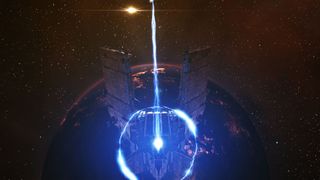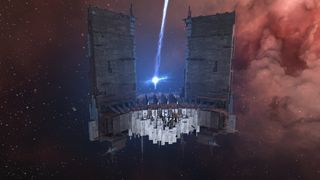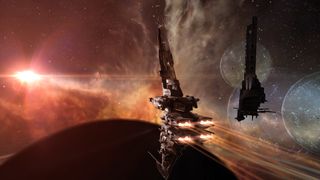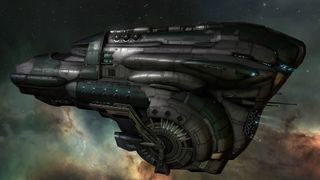The incredible journey to build EVE Online's first Death Star
How players quietly slipped EVE’s biggest, deadliest structure through a wormhole.

Few corporations in EVE Online will ever have a reputation like Hard Knocks Inc. More than just a group of elite soldiers, they routinely infiltrate alliances, blow up their most prized assets, and steal everything that isn't bolted down—and that's just on a Monday. Their ranks are made of brigands, thieves, scammers, and all the other refuse that slowly filters out of the more upstanding corporations of EVE. But instead of falling into chaos, Hard Knocks have become a weaponized nightmare. If EVE Online is a sandbox, these are the players who like kicking down all the sandcastles. This is the story of how they were the first to build the biggest sandcastle the galaxy of New Eden had ever seen.
In 2016, EVE Online introduced Citadel, an expansion that introduced indomitable new structures that pilots could build to better defend their space. Coming in three different sizes, these citadels are capable of dealing extreme damage against even the most coordinated invading fleet. When Citadels released, Hard Knocks have made EVE Online history three times. First, they built the first Fortizar-class large citadel. Then they celebrated by blowing up someone else's. And then, two weeks ago, they made history one more time when they announced the arrival of the first Keepstar-class extra large citadel—the biggest structure in all of EVE Online at the time.

Welcome to Fort Knocks
Meet the Keepstar citadel (above), the first of its kind anywhere in New Eden. This monstrous fortress is 800,000 meters squared and, in May of 2016, was the only one in existence in EVE. These citadels are so large that titans, the massive supercapital ships of EVE, can safely dock within its bays. Along their outer hull lies eight slots where anti-capital ship weapons are fitted, waiting to gut anything that gets too close. The crown jewel is a devastating weapon of mass destruction, one of EVE Online's "doomsday" weapons. With just the push of a button, Fort Knocks fires a beam of energy that bounces between ships, obliterating an entire armada in one fell swoop. Fort Knocks isn't just a weapon, it's practically an entire city, and it took Hard Knocks trillions of ISK (EVE's currency) and months of planning to build.
We absolutely don't need one, this is just a penis-waving contest here.
Jerzii Devil
Jerzii Devil is a senior director within Hard Knocks, but he also has a long history of corporate theft under his belt. When I ask him about why Hard Knocks felt like they needed an extra large citadel, he laughs. "We absolutely don't need one, this is just a penis-waving contest here," he says. "We just decided to build one because, why not?"
He tells me that Hard Knocks' road to owning the first Keepstar citadel started all the way back in the spring of 2015 when EVE Online's developer, CCP Games, first announced it would be adding the new structures. Plans began in earnest in November of 2015 through to January of 2016, when more details on citadels were becoming public. With only months until they would be officially launched and available to the citizens of New Eden, the race to be the first was on.

The road to citadels
"Early on we decided money wouldn't be the issue. We have all these older members, and they're all very rich," Jerzii says. But that didn't stop the alliance from hesitating to drop the 700 billion ISK required to purchase the blueprint needed to manufacture the Keepstar. For reference, EVE Online's largest battle, The Bloodbath of B-R5RB, cost an estimated 11 trillion ISK. For an even better reference, EVE Online's monthly subscription used to be sold in-game as an item that, in 2016, was valued at 900 million ISK and costs $20 USD. That implies that the estimated value of the Keepstar is around $15,000 in 2016.
If money wasn't a problem, however, manufacturing sure was. Being some of the biggest badasses in EVE Online had its downsides, like not welcoming pacifistic industrialists that many alliances rely on for income and wealth. For the first time in their history, Hard Knocks either needed to become the pilots that they so mercilessly slaughtered or, as Jerzii tells me, they could just find someone to do it for them. "We had to find a builder," he says. "We had a few possible people who might be able to build it for us, and eventually we got referred to this one guy. It seemed legit at first."
The biggest gaming news, reviews and hardware deals
Keep up to date with the most important stories and the best deals, as picked by the PC Gamer team.
That's when we found out that his plan was to basically dick us over and lead us on while he was building his own citadel.
Jerzii Devil
The arrangement was simple. Hard Knocks would pay this builder to create their Keepstar citadel for them, letting him handle the logistical nightmare of putting together EVE's equivalent of a Death Star while they stuck to what they were good at. It seemed like a good deal until a defector from the builder's group turned coat and had some interesting news for Hard Knocks. "The group he belonged to ended up imploding and we gained a few of their members. That's when we found out that his plan was to basically dick us over and lead us on while he was building his own citadel. That way he could stop us from building ours while he built his first."
Unwilling to trust anyone else, Jerzii and Hard Knocks knew that if they were going to build EVE Online's first Keepstar, they were going to need to do it themselves. They bought the Keepstar blueprint and made plans to start building. In a Reddit post, Hard Knocks member Noobman detailed the extensive effort required to gather the construction materials necessary: "I had 18 builders with 180-200 [construction jobs] needing [blueprint copies] every 3-4 days. I had 4-5 private [blueprint copy] makers producing constantly for me as well."
Hard Knocks was becoming an industrial powerhouse.

But now they had a new problem: gathering the staggering amount of resources needed to even begin production. "It was about three months until Citadel launched at this point," Jerzii says. "We were never going to fill the kind of demand we had to build a citadel before they launch." He tells me that himself, Noobman, and others placed characters within New Eden's most popular trade hubs, aggressively buying up all the materials they could. Elsewhere, other Hard Knocks pilots had given up their murderous ways to focus on aiding in other efforts, like manufacturing, hauling resources, and other logistical tasks.
Hard Knocks began stockpiling resources and manufacturing on March 16 and by April 19 they had finally gathered the entirety of the components necessary for their Keepstar. On April 27, 2016, when the Citadel update went live, Hard Knocks ferried hundreds of components and the blueprint to a station in high-security space, and began to assemble the Keepstar. Twenty days later, it was finished. But Hard Knocks now faced an even greater challenge. How the were they going to get the damn thing back home?
Moving day
Hard Knocks' home system is called Rage. This star system has no strategic or economic value. Its planets are mostly barren, its moons not abundant in valuable resources. It’s the kind of place that most wouldn't think twice about revisiting, and Hard Knocks have transformed it into the closest thing EVE Online has to hell—a bastion full of murderous thugs armed to the teeth and ready to tear apart any pilot that might stumble in. And even worse, no one even knows how to find Rage. In most cases, Rage finds them.
In EVE Online, each star system is connected by stargates that lead to neighboring systems, forming a vast tangle of pathways players can use to travel the galaxy of New Eden. They are strategic chokepoints, and it's not uncommon for stargates to be the center of EVE's epic battles. But around 4,000 star systems aren't connected by stargates at all. Instead, unstable wormholes stitch them together with the known universe for brief periods of time before collapsing and reopening with a brand new connection. This is where Hard Knocks calls home.

"Every day it's a new world," Jerzii Devil tells me. He describes life for a normal EVE pilot living in a region of space: "It's the same map, same enemies, same people passing through—it can get pretty stagnant." In wormhole space, however, every day new connections are made and broken with any of the thousands of star systems of New Eden. And for one unlucky system, each day they wake up to find Rage on their doorstep. But right now, that unpredictable nature of Rage was a curse.
"At one point we talked about building [the Keepstar] directly in Rage," Jerzii says. "But the directors were like, no way, we're not risking putting that much money in our system." So instead they opted to build the Keepstar in the safety of high-security space where space stations couldn't be destroyed by anyone trying to stop them. Once the Keepstar was in transit, that was a different story. There was little they could do to prevent someone from blowing up one of their freighters if they were determined to do so.
On May 17th, every pilot was hands on deck for the most important operation in Hard Knocks' history.
The police force that patrols high-security space regions, called CONCORD, is reactionary at best. Like a real police force, their mission is to bring criminals to justice, not prevent the crimes from happening in the first place. In order to keep their Keepstar safe, Hard Knocks was going to have to plan a clever ruse when it came time to move it.
On May 17th, every pilot was hands on deck for the most important operation in Hard Knocks' history. Because the alliance had been somewhat public about their intention of building the Keepstar, they had no guarantees that spies hadn't been carefully watching them for weeks now. Operational security was at its tightest. "We didn't tell our members what they were doing, where they were going, or how they were getting there," Jerzii says. "We had to keep everything close to the chest. Only the directors could see the maps we were using."
The plan was broken down into multiple initiatives that required every pilot to be on their best game. In the system of Paara, where the Keepstar was built, four pilots were chosen to fly freighters. Three would act as decoys to lure off any ambushes while one carried the Keepstar. Between the four freighters, an escort of almost 100 Tornado battlecruisers would accompany each vessel. "If anything comes at [the freighter], it's pretty much over," Jerzii says. "So we decided we didn't want anything to come at it. If we saw anything get near it or anything that even just looks like it might be an issue, we'd just destroy it."
But that was only one half of the operation. Back in Rage, pilots were ‘rolling wormholes’ like there was no tomorrow. Each wormhole connection in EVE Online degrades slowly over time, but can also be collapsed if enough mass passes through it. Using some hasty math, pilots can fly heavy ships through a wormhole repeatedly forcing it to collapse and automatically generating a new connection to a different part of New Eden. It's a brute force tactic, but if done enough times Hard Knocks stood a good chance at eventually getting a decent connection close to Paara. Meanwhile, another group of pilots were in covert-ops stealth frigates, using scanning probes to map networks of wormhole connections that might lead to a favorable route that way.
Eventually, a winding connection of wormholes was found that would lead the fleet from Paara, in high-sec, to Rage, in wormhole space. When they managed to clear high-security space without incident and enter into infinitely more dangerous wormhole space, Hard Knocks had their first unpleasant encounter.

The final stretch
Wrong Hole, an alliance of tough-as-nails wormhole dwellers like Hard Knocks were connected to the wormhole system they were passing through. If even one of their pilots caught wind of what Hard Knocks might be up to, the entire operation would end in disaster. Even if Wrong Hole didn't manage to destroy the freighter outright, Hard Knocks would never be able to safely set the citadel up in their system without worrying that half of the wormhole alliances were secretly waiting to get their revenge.
"We needed to get that connection gone," Jerzii says. "We had a small group of battleships start rolling the hole while a PVP fleet went to assist them in case they tried anything. We told [Wrong Hole] straight up, we have a huge fleet, just let us roll the hole, and nothing bad will happen. We didn't tell them what was going on or why, we just told them not to mess with us."
In an instant, he was stranded millions of light years from the rest of his fleet in a star system full of embarrassed and angry pilots.
Wrong Hole took the threat seriously and stood down, but as one Hard Knocks pilot went to roll the hole one last time, it collapsed behind him. In an instant, he was stranded millions of light years from the rest of his fleet in a star system full of embarrassed and angry pilots who were just forced to kowtow to a greater threat. He didn't last long.
Once safely inside of Rage, the Keepstar was "anchored," a process that took 24 hours and ended with a 15 minute vulnerability window where the citadel could easily be destroyed by a determined force. While much of the fleet took a break to recharge before the 15 minute timer, a second fleet locked down the hole to make sure no one could get in.
The move operation from Paara to Rage took 12 hours of planning and execution. The next day, the Keepstar came online without issue. Hard Knocks sent a tweet to a CCP developer, who soon after confirmed they were the first to build a Keepstar in EVE Online—a two month process requiring thousands of man hours, a trillion ISK, and one very nerve wracking escort mission.
When I ask Jerzii how stressful the whole situation was, he shrugs. "It went too smoothly," he complains. "I was kind of hoping for some hiccup or someone to try something."
Now that Fort Knocks is fully operational, Rage went from being a system most would avoid to one that you'd have to be insane to ever assault. I ask Jerzii why Hard Knocks would ever spend months of their time and a trillion ISK building EVE Online's most defensible structure in a system no one would ever want to visit in the first place. He laughs at me and explains it was never done to make their home more defensible. "Nobody was invading us anyway," he says. "Maybe this will make them try harder. People say we've painted a huge target on our backs, and that's exactly what we want."
With over 7 years of experience with in-depth feature reporting, Steven's mission is to chronicle the fascinating ways that games intersect our lives. Whether it's colossal in-game wars in an MMO, or long-haul truckers who turn to games to protect them from the loneliness of the open road, Steven tries to unearth PC gaming's greatest untold stories. His love of PC gaming started extremely early. Without money to spend, he spent an entire day watching the progress bar on a 25mb download of the Heroes of Might and Magic 2 demo that he then played for at least a hundred hours. It was a good demo.
Most Popular

